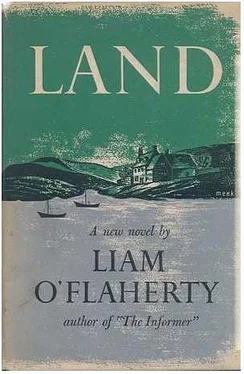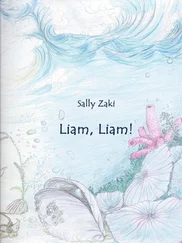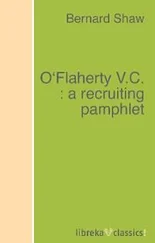Liam O'Flaherty - Land
Здесь есть возможность читать онлайн «Liam O'Flaherty - Land» весь текст электронной книги совершенно бесплатно (целиком полную версию без сокращений). В некоторых случаях можно слушать аудио, скачать через торрент в формате fb2 и присутствует краткое содержание. Город: London, Год выпуска: 2011, ISBN: 2011, Издательство: Bloomsbury Publishing, Жанр: Проза, на английском языке. Описание произведения, (предисловие) а так же отзывы посетителей доступны на портале библиотеки ЛибКат.
- Название:Land
- Автор:
- Издательство:Bloomsbury Publishing
- Жанр:
- Год:2011
- Город:London
- ISBN:9781448203888
- Рейтинг книги:3 / 5. Голосов: 1
-
Избранное:Добавить в избранное
- Отзывы:
-
Ваша оценка:
- 60
- 1
- 2
- 3
- 4
- 5
Land: краткое содержание, описание и аннотация
Предлагаем к чтению аннотацию, описание, краткое содержание или предисловие (зависит от того, что написал сам автор книги «Land»). Если вы не нашли необходимую информацию о книге — напишите в комментариях, мы постараемся отыскать её.
Land — читать онлайн бесплатно полную книгу (весь текст) целиком
Ниже представлен текст книги, разбитый по страницам. Система сохранения места последней прочитанной страницы, позволяет с удобством читать онлайн бесплатно книгу «Land», без необходимости каждый раз заново искать на чём Вы остановились. Поставьте закладку, и сможете в любой момент перейти на страницу, на которой закончили чтение.
Интервал:
Закладка:
O’Dwyer had sat down in front of the fire between Raoul and Father Francis. His gaiety of expression changed suddenly as Raoul uttered the word “stupid.” His face became frightening. Now it was apparent that Father Francis had not exaggerated when he said that the young man was in a bad state of mind.
“What do you mean by that remark?” O’Dwyer said slowly, clasping his laced fingers so tightly that the blood went out of them.
His cruel blue eyes were staring fixedly at Raoul, who was unable to prevent himself from feeling a little nervous.
“You are the living image of your father,” Raoul said. “I recognised you that day in my kitchen. Your father was the bosom friend of my youth. He was some years older than I, but similarity of ideas brought us together. Had he lived, he might have done great things. He had a brilliant intellect, together with indomitable courage and a natural capacity for leadership. His death was a great blow, not only to his friends, but to his country.”
“Thank you, sir,” O’Dwyer said in an angry tone, as he bowed jerkily.
“I had an idea,” Raoul continued, putting the tips of his fingers to his beard, “that you were trying to revenge your father’s death.”
O’Dwyer remained silent. He continued to stare fixedly at Raoul.
“Next to love,” said Raoul, “revenge is possibly the most exalted emotion. However, it must be subtle in order to be completely satisfying.”
He paused for a moment, smiled and then added in a lower tone:
“If Butcher had not been wearing a metal vest, where would he be now?”
“In hell,” O’Dwyer said curtly.
Raoul shrugged his shoulders.
“If such a place really exists, which I doubt,” he said, “we have no guarantee that Butcher would now be there. He is a clever fellow, and a famous man has said that God is always on the side of the big battalions. One simply does not know. All one knows is that he would be dead and out of mortal pain. Death by gunfire must be a pleasant sort of death, sudden and rather exciting. If I wanted to revenge myself on an enemy, I’d choose a much more subtle and lingering method.”
He paused, smiled once more and added:
“I’d torture him.”
Father Francis took his clay pipe out of his mouth, stared at Raoul in horror and then got to his feet.
“That’s a terrible thing you have said,” he cried angrily. “Let me tell you that the Irish people would never tolerate such methods. They are gentle and good people. What you are advocating is paganism.”
O’Dwyer put his hand on the priest’s arm and said curtly, like a man speaking to a subordinate:
“Sit down.”
The priest winced on feeling the rough touch of O’Dwyer’s arm. He looked at the young man reproachfully, as he resumed his seat.
“What kind of torture do you mean?” O’Dwyer said to Raoul.
“The torture of isolation,” Raoul said.
“Isolation?” said O’Dwyer.
“To isolate an enemy in the military sense,” Raoul said, “means cutting him off from all means of supply, reinforcement and escape. In this instance, I give a different meaning to the word. The isolation of Captain Butcher would not need to be physically complete, in order to be effective and bring about his destruction. He would merely require to be deprived of his power little by little, until he was alone and utterly helpless.”
“Horrible!” Father Francis said.
Raoul looked at the priest haughtily and said:
“To isolate a priest, for instance, one denies him access to the performance of certain rites, by means of which he renews his belief in God and the immortality of the soul.”
Father Francis jumped to his feet once more.
“All that is paganism,” he cried. “It’s inspired by the Devil.”
“How many times more do I have to tell you to keep quiet?” O’Dwyer said in the same curt tone. “Sit down at once.”
“Michael,” said the priest in a humiliated voice, “I didn’t think your father’s son would say a thing like that to me.”
O’Dwyer flushed a little and glanced towards Raoul.
“All right,” he said gruffly, looking once more at the priest. “Forget about it.”
“I went out with the Fenians in ’67,” Father Francis cried, with a note of arrogant defiance in his voice. “For that act of rebellion against my vow of obedience, I have since been deprived of the right to administer the sacraments. For twelve years I have followed my fate, the most miserable of God’s creatures, an anointed priest that is denied the right to perform the miracle of all miracles.”
“That’s enough now,” O’Dwyer said.
“I thought so,” Raoul said to himself. “An isolated priest. The torture of the Vatican.”
He got to his feet and bowed to Father Francis with great ceremony.
“I apologise,” he said, “for failing to realise that you are a great poet, until you spoke just now. Won’t you shake hands and forgive me for my discourtesy?”
The priest hesitated for a moment, while he looked at Raoul critically. Then he suddenly grasped Raoul’s extended hand.
“Forgive me, too,” he said with deep emotion, “for failing to realise that you are a good man. Even though you say queer things, that no good man should say, you are still a good man. We all have our foolish vanities. I see that giving voice to queer ideas is your pet vanity. God will forgive you for that. God forgives everything to the good. I want to be friends with you.”
“Splendid!” said Raoul. “I know that I’m going to value your friendship highly. The soldier, the poet and the monk represent what is finest in man. They represent man’s will to power, to beauty and to immortality. They alone among men are capable of complete love, because they love the unattainable. Their love is never tarnished by possession. Before all three of them, I always bow low. When I bowed to you, I bowed to all three.”
Father Francis sat down, took out a large red handkerchief and blew his nose violently to conceal his emotion. Raoul also sat down.
“How would you go about destroying an enemy by means of isolation?” said O’Dwyer, who had been staring intently at the fire during this interlude.
“For that,” said Raoul, “the efforts of a single man, or even a group of picked men like the Fenian Society, would be useless. The help of the whole people would be necessary.”
“The whole people?” O’Dwyer said excitedly, now fixing his gaze on Raoul.
“The whole people,” Raoul said, “disciplined and acting in obedience to a single will.”
There was silence for a few moments. Then O’Dwyer’s face suddenly lit with enthusiasm.
“I see that you now understand me,” Raoul said, touching his beard with his finger-tips.
“Maybe I do,” O’Dwyer said. “I want to hear your plan.”
“So do I,” Father Francis said.
“Then you are no longer opposed to the idea of torture?” Raoul said to the priest.
“Who am I to condemn the methods of such a wise man as you?” Father Francis said. “Great ideas are more powerful than an army with banners.”
“Thank you,” Raoul said, getting to his feet. “I’ll tell you about my plan, as soon as I have notified my daughter that she has two guests for supper. You can both stay, I trust.”
The two men accepted the invitation.
“Good,” said Raoul. “I hope that we have laid plans for setting the wheel of Irish destiny spinning by supper-time. I’m not a mystic, but I believe in destiny. A vice of some sort is necessary to maintain sanity.”
Chapter VII
Lettice looked frightened when Raoul came into the living-room and told her that O’Dwyer was staying to supper. Raoul put his arm around her shoulders and kissed her on the forehead.
Читать дальшеИнтервал:
Закладка:
Похожие книги на «Land»
Представляем Вашему вниманию похожие книги на «Land» списком для выбора. Мы отобрали схожую по названию и смыслу литературу в надежде предоставить читателям больше вариантов отыскать новые, интересные, ещё непрочитанные произведения.
Обсуждение, отзывы о книге «Land» и просто собственные мнения читателей. Оставьте ваши комментарии, напишите, что Вы думаете о произведении, его смысле или главных героях. Укажите что конкретно понравилось, а что нет, и почему Вы так считаете.












